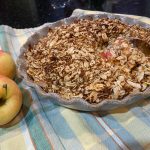
The Undeniable Health Benefits of a Plant-based Diet
 By Nancy Palermo Lietz, MD
By Nancy Palermo Lietz, MD
“The doctor of the future will give no medicine but will instruct his patient in the care of the human frame in diet and the cause and prevention of diseases. “ Thomas Edison
Americans have an obsession with nutrition, diet, and weight loss.
Countless books on the subjects hit the bestseller list, only to be replaced by the next publication in print. It should be no surprise that Dr. Colin Campbell’s book, The China Study, quickly hit the bestseller list. His epidemiologic project demonstrated thousands of associations between dietary factors and disease. The most relevant finding, however, was that those individuals who ate the most animal-based foods had the most chronic disease. More importantly, his findings launched thousands of studies in nutrition that have supported the benefits of whole foods, and plant-based diets.
The data is overwhelming, yet Americans do not seem to get the message.
Americans are in a worsening state of poor health. Two-thirds of Americans are overweight, and chronic diseases like diabetes, hypertension, heart disease, and cancer plague half of them. Almost 400 million individuals are living with type 2 Diabetes, and with current trends, it is estimated that the number will reach 600 million by 2035. The Mayo Clinic estimates that 70% of Americans take at least one prescription drug to manage a chronic disease. Research shows that these diseases are not only preventable but are reversible with dietary changes implementing a whole food, plant-based diet. The evidence supports this, yet Americans have been slow to adopt the recommended changes given the confusion introduced by food and pharmaceutical corporations and the medical field, touted as the catalysts for disease prevention.
In fact, it seems the Standard American Diet (SAD) is not only sad but worse than previously thought. A 2010 report from the National Cancer Institute showed that three out of four Americans do not eat a single piece of fruit in a given day, and nine out of ten don’t reach the minimum recommended intake of vegetables. Even worse, 95% of Americans get over 25% of their daily calories from junk food in the form of sodas and processed foods high in sugar, fat, and salt.
A Whole Foods Plant-based diet comprises mostly fruits, vegetables, legumes, and whole grains.
Plant-based diets allow for modest amounts of fish and lean meats. The diet is based on the principles of a Mediterranean and Anti-inflammatory diet. There are a number of reasons to adopt a whole food plant-based diet. By eliminating processed foods and slashing animal products, most individuals achieve ideal weight. A study out of the Johns Hopkins Bloomberg School of Public Health found that meat consumption was associated with central obesity in US adults. Those who consume meat typically take in an average of 700 calories more a day. Of those adults, 27% were more likely to be obese, and 33% of them had central obesity and visceral fat. Visceral fat is associated with inflammation and a number of chronic diseases, including heart disease and Type 2 diabetes.
More importantly, this diet has been shown to reverse heart disease. Dean Ornish, MD, is the founder and president of the non-profit Preventative Medicine Research. Studies are funded in his plant-based heart program currently offered in some medical centers nationwide. His program has repeatedly shown that when the body is given the right environment, it is able to heal itself. In the study centers, long-term studies have shown that a plant-based diet with moderate exercise and stress reduction can reverse heart disease.
Cholesterol plaques and clogged arteries were cleared, and angina attacks were reduced by 90% after only a few weeks on the program. In addition, research from the Harvard School of Public Health has shown reductions in BP, even enough to reduce or discontinue medication, after the institution of a diet rich in vegetables and fruits. Animal protein intake and processed foods have also been linked to increased incidence of many forms of cancer. The increase is felt to be related to the production of IGF-1 (insulin-like growth factor). Elevating this factor is normal in childhood development, but when elevated in adulthood, high levels have been known to increase the growth, proliferation, and spread of cancer cells.
Low protein diets are associated with reduced IGF-1 and reduced levels of oxidative stress, inflammation, insulin sensitivity, and chronic disease. Longitudinal and epidemiological studies have shown areas known as “ Blue Zones” with high vegetable and fruit intake low in pesticides, low intake of processed foods, and low animal protein intake have significant reductions in all forms of cancer, diabetes, and heart disease.
Individuals living in these areas lived longer and were generally free of chronic disease. When these individuals move to Western countries and adopt a high meat intake, cancer rates, especially breast, colon, and prostate, increase drastically. Vegetables and fruits contain more fiber; more importantly, they supply the body with phytonutrients. These natural chemicals are considered Nature’s medications and have significant anti-oxidant properties. In vitro studies have actually shown anticancer properties demonstrated by these natural compounds. The bad news is they cannot be produced or boxed up.
The only way to get these powerful agents is through whole foods and diets rich in fruits, vegetables, legumes, and whole grains. In “How Not to Die,” Dr. Micheal Greger laboriously reviews the most current scientific research in Nutrition and applies the findings to the top killers in the U.S. The data doesn’t lie. When patients implemented dietary changes, many of these disease states were either prevented, reversed or improved. He goes on to make recommendations to incorporate the changes into day-to-day living to give patients a path to health improvement.
The transition to a Whole Foods Plant-based diet cannot happen overnight.
- The aim should be small, deliberate changes that can be introduced slowly. There is no perfection to this diet, but there are some core principles individuals should aim to adopt. Aim to make 90 95% of your diet plant-based. That means you get most of your calories from fruits, vegetables, legumes, and whole grains.
- Eliminate all processed foods from your diet. As Micheal Polian says, “If it grows on a plant you can eat it. If it was produced in a plant, avoid it.” That means no sodas and a significant reduction in foods that are boxed and bagged.
- Consume meat in smaller amounts or aim to eat meat less than three times a week. Purchase grass-fed, organic meats and choose leaner cuts. Even better, replace two to three of your meats with fish.
- Reduce or eliminate dairy, especially dairy that is high in animal fat.
- Eliminate sodas and caloric drinks like sweet tea (regular, diet, and light) from your diet. Replace these beverages with water, coffee, green and white teas.
- Aim to eat at least one serving of legumes (1/2 cup) a day
- Aim to eat at least 8-12 servings (1/2 cup) of fruits and vegetables a day
- Eat a serving of nuts and seeds every day (1⁄2 cup)
- Eat one serving (1/2 cup) of whole grains daily.
- Drink at least 6-8 glasses of filtered, unbottled water. Take charge and be responsible for the direction of your health. Be patient. Change is hard, but any changes you make today will be noticeable and appreciated tomorrow.
Resources
- Nutritionfacts.org
- How Not to Die by Micheal Greger MD
- The China Study by T. Colin Campbell PhD and Thomas Campbell MD
- Forks over Knives The Cookbook by Del Sroufe
- A Plant Based Life By Micaela Cook Karlsen
- The Plant-Based Journey by Laani Muelrath



